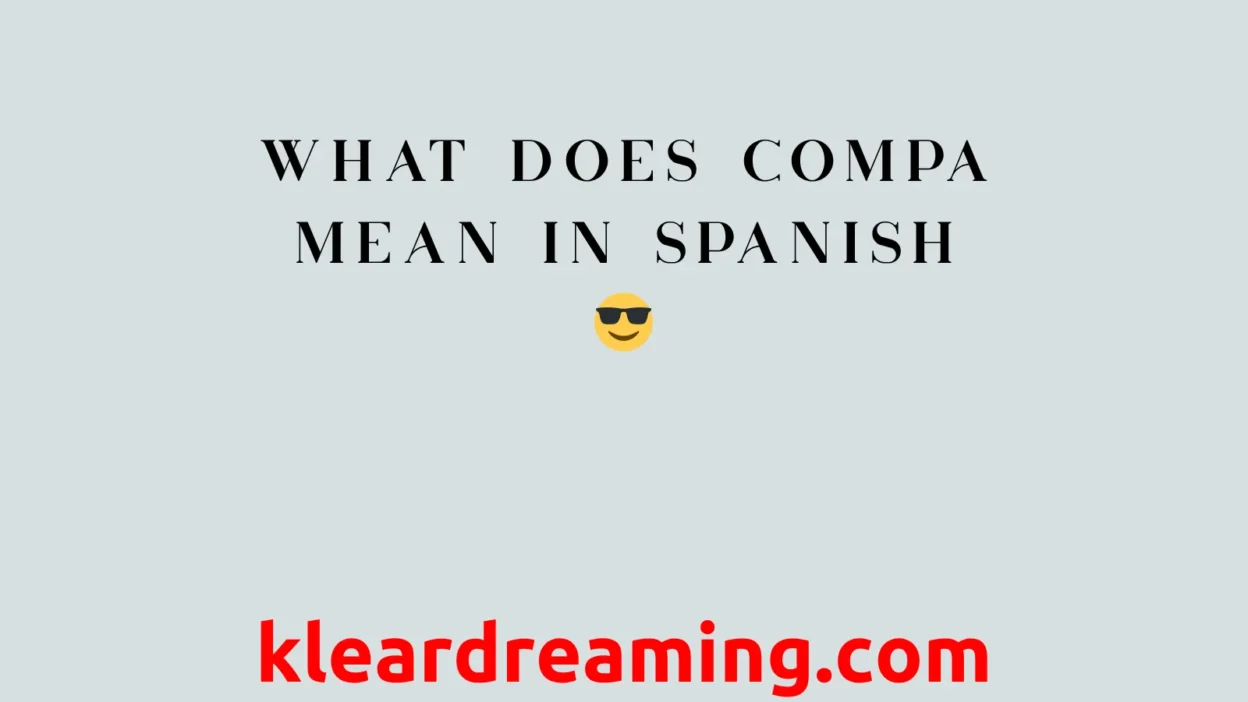Have you ever scrolled through a chat or a TikTok comment and suddenly saw someone write “compa” and paused, wondering what it meant? Maybe you thought it was a typo, a nickname, or even a secret code! If that sounds familiar, don’t worry — you’re not alone.
Compa is a popular Spanish slang word that carries warmth, friendliness, and a sense of camaraderie. You’ll see it in texts, social media, and even casual spoken conversations across Latin America. It’s informal, casual, and perfect for showing someone you consider them a buddy or close friend.
Quick Answer: Compa means “friend” or “buddy.” It’s a friendly, casual way of acknowledging someone you’re comfortable with, much like “bro” or “mate” in English.
What Does Compa Mean in Text? 💬
Compa is a shortened form of compadre, a word historically used to describe a godfather or a close family friend. Over time, it evolved into modern Spanish slang, commonly meaning friend, pal, or buddy.
Think of it as a way to say “Hey, you’re my person” in a friendly, casual tone. Unlike formal greetings, it conveys closeness and trust.
Example:
A: ¿Qué onda, compa?
B: Todo bien, bro 😎
Tone and Usage
- Friendly ✅
- Casual ✅
- Informal ✅
- Playful or supportive ✅
- Not flirty ❌
- Not professional ❌
In short: Compa = Compadre = Friend/Buddy
The Origin and Cultural Significance of Compa 🕰️
Understanding the history of compa helps you grasp its cultural importance:
- Root Word: Compadre originally referred to a godfather or a person entrusted with responsibility for a child’s upbringing. It symbolized trust, loyalty, and a strong bond.
- Modern Evolution: Over the years, compadre became compa, making it short, casual, and easy to text or say aloud.
- Cultural Significance: In many Latin American countries, using compa reflects friendship, solidarity, and social connection. It shows that you consider someone part of your inner circle or trusted group.
💡 Fun Fact: In Mexico, saying “compa” to someone is almost like saying “you’ve got my back” — it’s more than just a greeting.
Regional Variations of Compa 🌎
While compa is widely recognized across the Spanish-speaking world, the meaning and usage can differ slightly:
| Country/Region | Meaning & Usage | Notes |
|---|---|---|
| Mexico | Friend, buddy | Extremely common, informal, conveys trust |
| Central America | Close friend | Friendly and casual, often in everyday chats |
| Colombia | Friend, bro | Similar to “parce”; casual and fun |
| Spain | Less common | Mostly youth slang; used in social media or texting |
| Argentina | Casual friend | Informal, more localized slang exists like “che” |
| Chile | Friend, mate | Informal; sometimes used with playful teasing |
Pro Tip: If you’re texting someone from a different country, the tone of compa might vary. Always pair it with friendly emojis to convey warmth.
Where Is Compa Commonly Used? 📱
You’ll see compa everywhere informal Spanish is spoken:
- 💬 Texting: WhatsApp, iMessage, SMS between friends
- 📱 Social Media: Instagram, Facebook, Snapchat, TikTok comments
- 🎮 Gaming Chats: Especially online multiplayer games where casual, friendly chatter is common
- 😎 In Person: Casual greetings among friends, especially in Mexico and Central America
Emoji Usage: Emojis are your best friend when using compa. They enhance the tone, emotion, and relatability.
| Emoji | Meaning | Example |
|---|---|---|
| 😎 | Cool, laid-back | Todo bien, compa 😎 |
| 😂 | Humor, joking | No puedo creerlo, compa 😂 |
| 🙌 | Excitement, celebration | Sí, compa, ganamos 🙌 |
| 👋 | Casual goodbye | Nos vemos, compa 👋 |
| 🍕 | Fun, casual plans | Vamos a comer, compa 🍕 |
Examples of Compa in Conversation 💬
Greetings and Check-ins
- A: ¿Qué onda, compa?
B: Todo bien 😎 - A: Hola compa! Cómo estás?
B: Bien, bro 😂 - A: Feliz viernes, compa!
B: Gracias, bro 😄 - A: ¿Qué tal tu día?
B: Cansado, compa 😴
Invitations and Plans
- A: ¿Vamos al cine hoy?
B: Claro, compa! 🍿 - A: Videojuegos esta noche, compa?
B: Sí, cuenta conmigo 🎮 - A: Vamos a comer tacos, compa!
B: Va, bro 🌮 - A: Fiesta en mi casa el sábado, compa
B: Perfecto 😎
Support and Help
- A: Ayuda con la tarea de español
B: Dale, compa! - A: No entiendo este ejercicio
B: Tranquilo, compa, te explico - A: Me siento triste hoy
B: Ánimo, compa ❤️ - A: Necesito un consejo rápido
B: Dime, compa
Gaming Chats
- A: Preparado para la partida, compa?
B: Sí bro, vamos a ganar 🎮 - A: Cúbreme mientras cambio de arma, compa
B: Entendido 😎 - A: Buen tiro, compa!
B: Gracias, bro 😂
Social Media Comments
- ¡Genial tu video, compa! 😂
- Me encanta tu estilo, compa 😎
- Gracias por la recomendación, compa 🙌
When to Use and When Not to Use Compa 🕓
✅ When to Use:
- Friendly chats with close friends
- Casual social media interactions
- Gaming or hobby group conversations
- Supportive or encouraging messages
- Group chats with buddies
❌ When Not to Use:
- Formal work emails
- Professional meetings or presentations
- Serious or urgent situations
- With strangers or people you don’t know well
Comparison Table:
| Context | Example Phrase | Why It Works |
|---|---|---|
| Friend Chat | “No rush, compa 😄” | Casual & friendly |
| Work Chat | “Take your time.” | Polite & professional |
| “Please take your time to review this.” | Formal & clear | |
| Social Media | “Gracias compa! 😂” | Friendly & relatable |
| Gaming Chat | “Cúbreme, compa 🎮” | Casual, fun, supportive |
Similar Slang Words or Alternatives 🔄
| Slang | Meaning | When to Use |
|---|---|---|
| Bro | Friend/Buddy | Casual chats, online |
| Amigo | Friend | Everyday, friendly |
| Cuate | Buddy | Mexico, informal |
| Carnal | Close friend | Very casual, affectionate |
| Parce | Friend | Colombia, informal |
| Mano | Bro, buddy | Informal, friendly |
💡 Tip: Using these along with compa in your texts can make your Spanish slang feel authentic and regionally aware.
FAQs About Compa ❓
Q1: Is compa formal or casual?
A: Casual — never use it in formal or professional contexts.
Q2: Can I use compa with someone I just met?
A: Best with friends or people you know well. Using it with strangers may feel too familiar.
Q3: Is compa the same as amigo?
A: Similar, but compa is more casual and friendly, whereas amigo is standard Spanish.
Q4: Is it used only in Spain?
A: No! It’s widely used across Latin America, especially Mexico, Central America, and some South American countries.
Q5: Can compa be flirty?
A: Generally, no. It’s friendly, supportive, and casual, not romantic.
Q6: Can I use compa in gaming chats?
A: Absolutely! It’s very common in online gaming communities.
Q7: Is there a feminine form of compa?
A: Not officially; it’s mostly gender-neutral in informal contexts.
Q8: How do I pair emojis with compa?
A: Use emojis to enhance tone: 😎 for cool vibes, 😂 for humor, 🙌 for excitement.
Fun Tips for Using Compa in Social Media 🌟
- Pair it with trendy emojis for relatability.
- Use in memes or funny captions to connect with friends.
- Mix with regional slang like bro, parce, cuate for authenticity.
- Avoid using in formal or professional posts — it’s strictly casual and friendly.
- Emphasize tone: emojis can turn a neutral compa into supportive, playful, or humorous.
Conclusion 🎯
Now you know: compa is more than just a word. It’s a symbol of friendship, trust, and casual camaraderie in Spanish-speaking communities. Use it confidently in texts, social media, and gaming chats, and pair it with emojis to add warmth and tone.
Example: “Todo bien, compa 😎”
By understanding its regional nuances, history, and emoji pairings, you can use compa like a native Spanish speaker.



